Monday, February 23, 2009, 08:30 - Commentary, Photo of the Day
Štúrovo, SlovakiaThe European Union is perhaps the most perfectly imperfect of all multinational institutions. If it were a car, it would be held together by duct tape right about now. But that is not preventing the drivers, nearly thirty at this point, from trying to drive this metaphorical car as recklessly as possible, as if they are trying to strain every rivet and bolt to see if they can be the one to send the constituent parts flying in every direction and rather unmindful of what impact that would have on themselves. We learn more from the New York Times.

The joy of politics. Vienna 2008. © Damaso Reyes
“The European Union and the European Central Bank are struggling to deal with a broad economic crisis that is affecting every European country, some feeling it far worse than others. Under the pressure of the crisis, a collective of shared sovereignties built on the idea of a common market of goods and services is being riven by statist policies and incipient protectionism.
“The eurozone itself is being strained by the desire of some countries, like France, to suspend or break budgetary rules and spend their way out of the crisis, and by the poor performance of countries like Greece, Italy and Spain, which have never cared much for the budgetary rules and can neither devalue their currencies nor alter interest rates. The Czechs, like the Germans, are much more cautious about violating European fiscal standards.
“In a time of economic crisis, we see atavistic instincts emerging,” said the Czech foreign minister, Karel Schwarzenberg, describing the way that individual nations are responding to popular distress by patriotic and protectionist measures and statements and by playing down the unity of Europe.”
I don’t know what it will take for the leaders of Europe to realize that they can accomplish far more together than they can separately. I am beginning to think that ultimately it will become what it has always been, a process of osmosis, slow and steady. I had believed that the E.U. had reached something of a critical mass but increasingly I think that further integration is something which must happen at the lowest levels possible, namely between people because the politicians are too invested in their own power, however limited it may be, to give any of it up any time soon…
| 0 trackbacks
| 



 ( 3 / 2038 )
( 3 / 2038 )




 ( 3 / 2038 )
( 3 / 2038 )
Thursday, February 19, 2009, 11:40 - Commentary, Photo of the Day
Sturovo, SlovakiaKosovo just celebrated its first independence day this week. The country has come a long way in the past year but there are still many hurdles not least of which is the fact that most nations in the world, including several members of the European Union, do not yet recognize Kosovo as an independent state. We learn more from the International Herald Tribune as well as from the Economist.
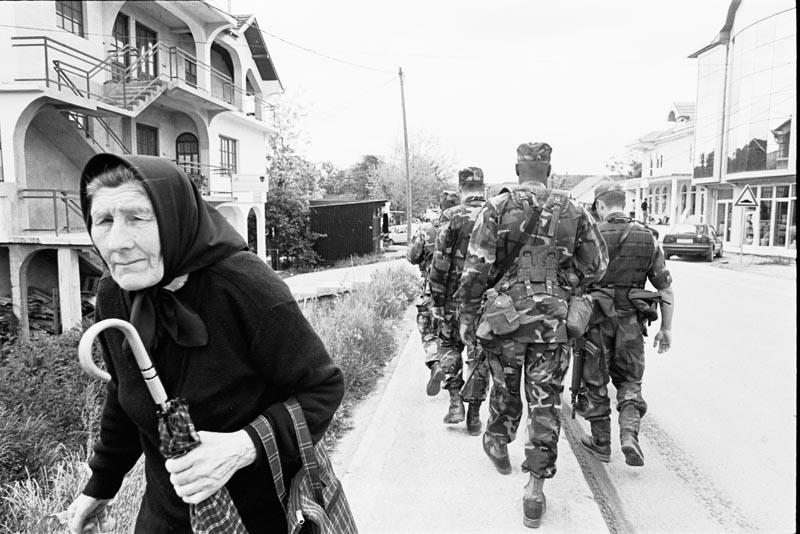
An uncertain future. Kosovo 2005 © Damaso Reyes
“Jubilant ethnic Albanians poured into the streets Tuesday to celebrate the first anniversary of Kosovo's independence from Serbia, as nationalist Serbian lawmakers joined their ethnic kin in northern Kosovo to try to undermine the tiny country.
“The twin moves highlighted the division that has plagued Kosovo and threatens to split it along ethnic lines. It also underscored the challenge Kosovo's authorities face in asserting control over areas where Serbs live."
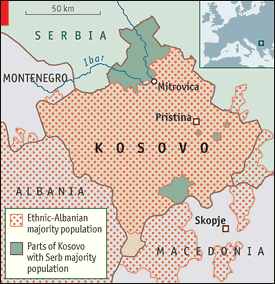
The Economist states:
“The bad news is that Kosovo remains poor and its administration weak. Serbia’s government has led a highly effective diplomatic campaign against it and Kosovo has a bad image abroad. Yet it is often unfairly singled out for blame. It lies on a main drug-trafficking route, for instance; but so do some EU members, such as Bulgaria and even Austria.
“It is widely believed that Albanians, including Kosovars, play an inordinately large role in Europe’s drug cartels, but research does not often bear this out. According to a report by the Kosovar Stability Initiative, a think-tank, in 2006 only 6% of those arrested for heroin smuggling in Italy were ethnic Albanians; 65% were Italians and 19% were north Africans. Some stereotypes widely believed and repeated about Kosovars abroad are merely racist.
“So are Kosovars downcast? Far from it. A recent survey by the European Fund for the Balkans and Gallup found that, among seven western Balkan countries, Kosovo’s people are the most satisfied. They will certainly enjoy their birthday.”
Kosovo was, and still is, an important test for the European Union. The simple fact that not all E.U. members have recognized Kosovo is a prime example of the dysfunction that E.U. foreign policy is beset by. How the E.U. managed, or mismanaged Kosovo’s move towards independence highlights the need for a common foreign policy, or at least one that members can agree on. Until member states realize they can accomplish more on the global stage as a group than they can independently the status quo will likely remain…
Wednesday, February 18, 2009, 08:05 - Commentary, Photo of the Day
Sturovo, SlovakiaWhen a young child jumps up and down and screams do you:
A.) ignore the child
B.) hit the child
C.) try to calmly reason with the child
Well the saga of Geert Wilders, a Dutch right-wing politician continues. He was recently banned from entering the United Kingdom even though he was invited by members of parliament. We learn so much more about the sorry incident from Der Spiegel and The Guardian.
“He was refused entry … anybody who is refused entry to the UK will be detained and returned," a Home Office spokesperson told the French news agency AFP. "The government opposes extremism in all its forms. It will stop those who want to spread extremism, hatred and violent messages in our communities from coming to our country."
The Dutch politician had vowed to defy the Home Office's order to bar him from the country so that he could present his film "Fitna" in the House of the Lords, where he had been invited to show it. In its letter earlier this week, the Home Office claimed Wilders' visit would pose a "genuine, present and sufficiently serious threat to one of the fundamental interests of society. … Your statements about Muslims and their beliefs, as expressed in your film 'Fitna' and elsewhere, would threaten community harmony and therefore public security." The ban is a blanket one that Britain claims has been applied using EU laws that allow member states to exclude entry to anyone whose presence could threaten public security,” Der Spiegel writes.
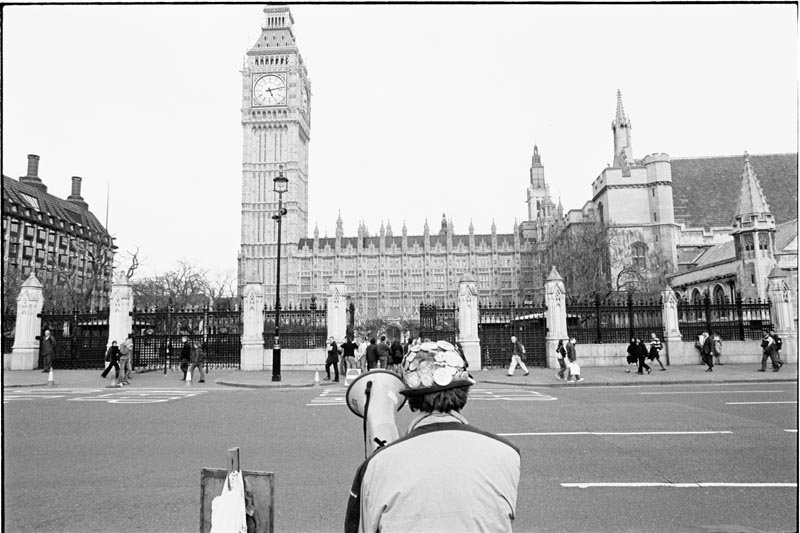
Fight for your right to protest! London 2005 © Damaso Reyes
“The National Secular Society president, Terry Sanderson, said he wrote to the home secretary, Jacqui Smith, saying she should not have denied an application by a "democratically elected politician from a sovereign state who wants to come and express an opinion".
"It may be a controversial opinion but he is entitled to express it," he said.
“The Home Office has said it would "stop those who want to spread extremism, hatred and violent messages in our communities from coming to our country.
“The Liberal Democrat home affairs spokesman, Chris Huhne, said that while it was important to defend freedom of speech, Wilders "has overstepped the line that should be defended in a civilised society," The Guardian tells us.
That last statement is the one I have the biggest problem with. Who should have the right to say where the line is in a civilized society? Once the government has that power all sorts of unpopular things, people, ideas get banned. More importantly society misses out on having a sincere debate on important issues. Wilders and his ideas will not go away simply because he was turned away at the airport. If anything this silly incident has give him and his viewpoint far more attention than it otherwise would have had. Like it or not he is the democratically elected representative of his district and if Obama can say that America should reach out to Iran and North Korea why can’t the U.K. engage with someone like Wilders?
Is British democracy so fragile that it cannot withstand ideas it finds unpalatable?
Friday, February 13, 2009, 08:51 - Commentary, Photo of the Day
Štúrovo, SlovakiaI thought I would end the week on a positive note, or at least as positive as I can manage given the state of the world at the moment. A new government has been formed in the storm battered nation of Iceland. At its head is Prime Minister Johanna Sigurdardottir, whom we learn more about from the International Herald Tribune.

Let the games begin! Stuttgart 2007 © Damaso Reyes
“Sigurdardottir, 66, is a former flight attendant and union organizer, and served as social affairs minister in the previous government.
“She is Iceland's first female prime minister, and her Cabinet is the country's first to be split evenly between men and women.
“Sigurdardottir also is the first openly gay national leader of modern times, apart from Per-Kristian Foss, a Norwegian politician who briefly served as his country's prime minister in 2002.”
Progress comes in many shapes and forms. In America, the election of Barack Obama is one such example; another is the fact that we have had two female Secretaries of States in a row, the current one would likely have been president if Obama had not won the nomination. It seems like more and more we are heading towards a world where the circumstances of one’s birth will not limit one’s opportunities. But as we all know a world where that is fully realized is still some time away.
Thursday, February 12, 2009, 08:54 - Commentary, Photo of the Day
Štúrovo, SlovakiaLife in Europe is very much dominated by history. Be it the monuments to those lost in war or the traditions which have been passed along down the centuries history is ever with us here. An interesting article from Der Spiegel in Germany talks about some recent history.
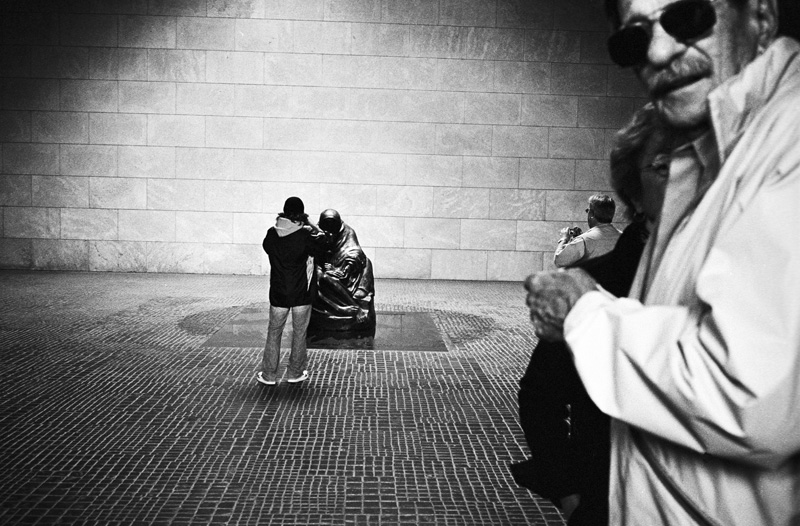
Monument to the dead. Berlin 2007 © Damaso Reyes
“Chris Gueffroy died in February, 1989 while trying to flee across the Berlin Wall. He was the last East German citizen to fall victim to the state's policy of shooting escapees in the divided city.
“Berlin paid tribute Thursday to the last person shot trying to cross the Berlin Wall. Chris Gueffroy died in a hail of bullets as he tried to flee East Germany on the night of Feb. 5-6, 1989. He was the last person to fall victim to the East German policy of shooting people trying to flee across the Berlin Wall -- although more were to die trying to escape from East Germany before the borders were opened on Nov. 9, 1989.”
If that wall had not come down I would likely not be writing from Slovakia right now. I remember growing up it was hard to imagine a world where there wasn’t a Soviet Union and today several Warsaw Pact nations are now part of the E.U., that most capitalist of institutions. They also have a common currency, something they didn’t even have under the Soviets!
But it is also important to remember those who made the sacrifices for the freedoms we enjoy. Though it is hard for people of my generation and those younger than I to understand the walls that once divided us we know all too well about the cultural and economic ones that still exist.
Wednesday, February 11, 2009, 07:01 - Commentary, Photo of the Day
Štúrovo, SlovakiaEurope needs a constitution. And it certainly needs a first amendment as we learn in an article from the New York Times.
“Four executives of Google begin trial Tuesday in Milan on criminal charges of defamation and privacy violation in regard to a video posted on Google’s Italian site.
“The case involves a three-minute cellphone video, posted in 2006 to Google Video, in which four youths in Turin tease a boy with Down syndrome. After an Italian advocacy group complained that the video was objectionable, Google quickly removed it from the site. Prosecutors argue that the video should not have been published at all.”
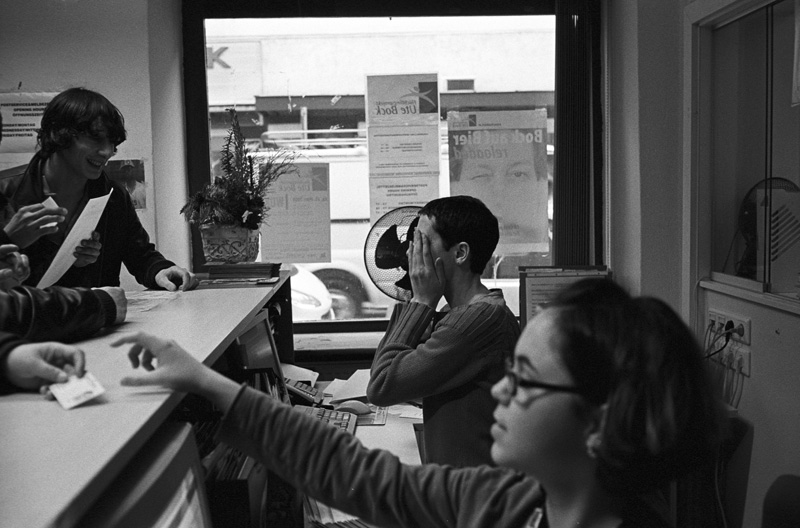
Stop, my head is hurting! Vienna 2008 © Damaso Reyes
First I think if we want to live in a society where there is a free exchange of ideas we have to be willing to be offended. Second, when we start putting restrictions on speech, whether it is something odious like denying the Holocaust or disturbing like the case above, we start down a very slippery slope. Why should an Italian court decide what goes on Google Video? More importantly will they be able to control content that is not made or hosted in Italy but can be seen by Italians? You begin to see the enormous challenges that we face when we start to regulate speech.
Banning political parties and books and speech is a tradition in Europe, one that modern democracies can do without. We can object to and argue against speech and ideas we find repulsive without banning them. Once the government begins to do that it won’t be long until we are living in Oceania...
Tuesday, February 10, 2009, 08:47 - Commentary, Photo of the Day
Štúrovo, SlovakiaWhat’s truly ironic is that if America had treated the huge wave of 19th century Italian immigrants they way Rome is, and has proposed treating the African migrants who come to its shores every day I doubt there would be a pizza shop in Brooklyn. Italians, along with the other immigrants who came to America seeking opportunity have contributed far more than they have taken. What is to say that African immigrants won’t do the same? As we learn from Der Spiegel, yet another controversy has erupted around the Italian policy towards immigrants.
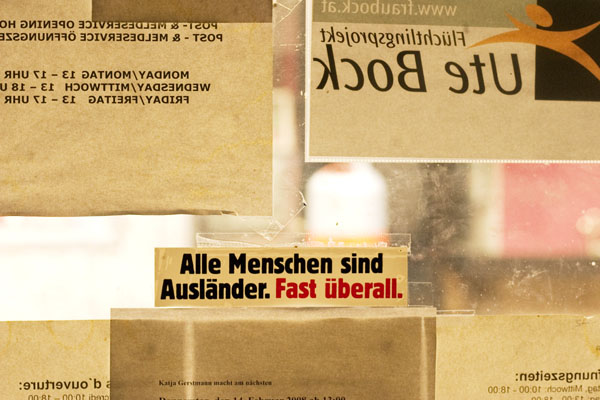
If only they could read German. Vienna 2008 © Damaso Reyes
“Under Rome's proposed new policy, refugees will no longer be transported directly to the mainland, but will be held in camps on the island instead. Lampedusa is ideal for this purpose. No one can leave without a boat, and a stranger would have trouble hiding for more than a few minutes in the single town on the island. The Africans shall be deported to some other country, eventually -- but it will be difficult, and it will take time.
“The 6,000 Italians living on Lampedusa have spent the last two weeks rioting and striking to protest the government's plans for their island. They are worried that the detention center could harm tourism, one of the mainstays of the local economy. After all, who books a vacation in Guantanamo? Some fear that thousands of refugees will converge on Lampedusa, and that the entire operation will be bigger than the Americans' notorious detainee camp.”
Clearly any policy that can be readily compared to the Guantanamo is not well thought out. Of course one could say that bringing back the current prime minister might not have been the best move either (a better argument for term limits cannot be found). It seems that even Italians are becoming tired of the xenophobic and reactionary policy their government is taking. Whether that will be enough remains to be seen…
Monday, February 9, 2009, 10:33 - Commentary, Photo of the Day
Štúrovo, Slovakia“Davide Boni, a councillor in Milan for the Northern League, which also opposes the building of mosques in Italian cities, said that kebab shop owners were prepared to work long hours, which was unfair competition.”
This is just one paragraph from a great article in the Telegraph. It seems that some right wing politicians have decided that the “invasion” of foreign food in Italy must be stopped at all costs.
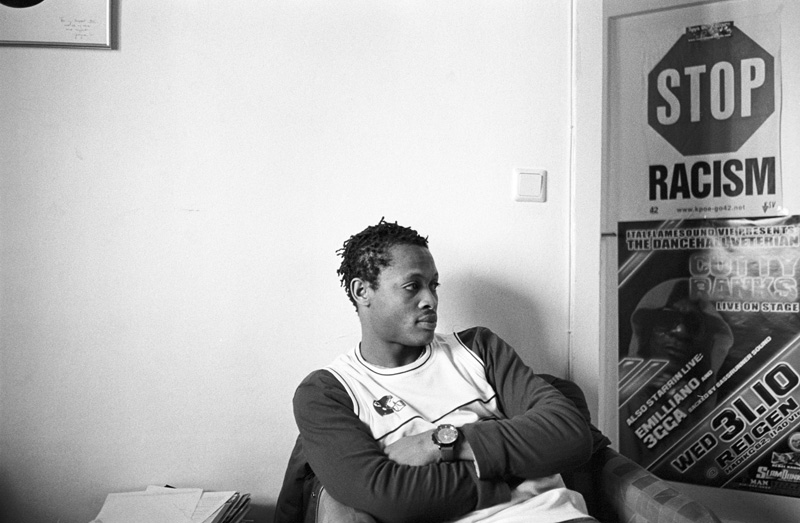
First food then people. Vienna 2008 © Damaso Reyes
“The tomato comes from Peru and spaghetti was probably a gift from China.
It is, though, the “foreign” kebab that is being kicked out of Italian cities as it becomes the target of a campaign against ethnic food, backed by the centre-right Government of Silvio Berlusconi.
“The drive to make Italians eat Italian, which was described by the Left and leading chefs as gastronomic racism, began in the town of Lucca this week, where the council banned any new ethnic food outlets from opening within the ancient city walls.
“Yesterday it spread to Lombardy and its regional capital, Milan, which is also run by the centre Right. The anti-immigrant Northern League party brought in the restrictions “to protect local specialties from the growing popularity of ethnic cuisines.”
Not only is this nonsense, it is offensive. If the only way your culture can survive is to diminish others then what you seek to protect is not long for this world. First, kebabs are yummy, as anyone who has had one can attest. Second, it is doubtful that Italians will ever stop eating pasts. This move is simply an attempt to stoke divisiveness, one that most Italians will see through.
But of course it is still a worrying phenomenon. I can only hope that Italian politicians will stop focusing on these petty issues and begin to address themselves to the economic issues which are crippling the nation. The quote at the top of this entry is a perfect example of the backwardness that some, even elected officials, still cling to. In America the “hardworking immigrant” is an ideal that we hold in esteem. Clearly some Italians seem to think working hard and long hours is a bad thing, which is probably why the country is in the shape that it is in. If Italian politicians keep this up people will no longer refrain from laughing behind their back but do it to their faces!
Friday, February 6, 2009, 08:23 - Commentary, Photo of the Day
Štúrovo, SlovakiaIt looks like the economic downturn will give the protectionists in the U.K. we spoke about earlier in the week exactly what they want, as we read in The Guardian.

Guess he won’t be coming to London after all. Cologne 2007 © Damaso Reyes
“The use of migrant labour in Britain will decline abruptly as companies face a sharp fall in demand for their goods and services, the Confederation of British Industry told MPs yesterday. John Cridland, the CBI's deputy director general, told the Commons home affairs committee that the first response of many firms to the downturn was to reduce their dependency on agency staff, many of whom are migrant workers.
“He said that there was evidence that many nationals of new EU states were going home as unemployment rose in Britain and suggested that the flow of skilled migrants from outside Europe would also decline. He added: "I expect that, when we have the next report from the [Home Office's] migration advisory committee on the needs for skilled labour, we will not see the same need for non-EU labour in the same numbers because of the need to provide as many employment opportunities as possible for the unemployed. All I'm suggesting is that the market will correct itself, but what we cannot avoid is a significant increase in unemployment, which is a sad but inevitable consequence of recession."
And where will that leave British workers and consumers? It’s doubtful that they will be much better off than they were before, after all, if Pawel from Lodz won’t come and work will Tom from Coventry all of a sudden be gainfully employed? Doubtful I think. More importantly the money these migrant workers were adding to the economy and the taxes they were paying will likely be lost. Many of these workers are being laid off and fired, meaning those jobs just don’t exist. More importantly will Brits be willing to work for the wages that even immigrants won’t? Also doubtful I think…
Wednesday, February 4, 2009, 08:42 - Commentary, Photo of the Day
Sturovo, SlovakiaIf anyone thinks that immigration is a problem which will go away with enough enforcement is living in a fantasy world. Just take a look at Italy, which for years has used some of the harshest methods when dealing with illegal immigration. That doesn’t seem to be working as we learn from an article in the International Herald Tribune.
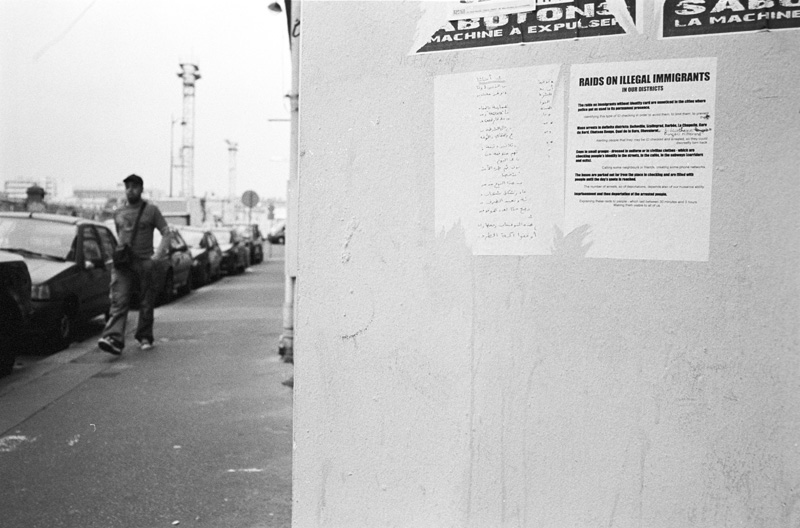
The writing is on the wall. Paris 2007 © Damaso Reyes
“Hundreds of migrants and refugees have broken out of an overcrowded immigration center on an Italian island to protest their treatment, the authorities said.
“About 600 people forced open the gates Saturday and marched toward the center of the island, Lampedusa, before making their way back, according to officials at the immigration center and news reports.
“About 2,000 people have been crammed into a structure built for 850.
“Last week, the United Nations refugee agency criticized Italy for the conditions there, saying many people slept outdoors under plastic sheeting and urging the authorities to address the "difficult humanitarian situation."
Even with these conditions imposed upon them if they are caught, still they come. It certainly says something about the determination that those who seek a better life in Europe has. I think it says even more about just how ineffective these measures are…
Tuesday, February 3, 2009, 07:40 - Project News, Commentary, Photo of the Day
Sturovo, SlovakiaThis is the 100th Photo of the Day! Exciting, isn’t it?

Let the good times roll. Cologne 2007 © Damaso Reyes
I started this series for a few different reasons. I wanted to be able to post every day but the day in and day out of shooting is far less exciting and glamorous than Hollywood leads you to believe. I thought by posting interesting news items it would give us all a chance to both observe what is happening here in Europe and discuss it. I hope you have found these posts of interest to you.
In the meantime, scandal and controversy are shaking the small nation of Wallachia as we learn from the New York Times.
“A political coup has shaken the Czech Republic since Boleslav the Kind Hearted Forever was ousted as king of Wallachia, a sleepy kingdom where locals drink 110-proof plum brandy for breakfast and use a wheat-backed currency pegged to the dollar.
“The faux Kingdom of Wallachia is nestled in the northeast corner of the Czech Republic, 230 miles from Prague. It was founded in 1997 by the itinerant photographer Tomas Harabis, its current foreign minister, as an elaborate practical joke.
“The ruse quickly captured the imagination of Czechs, long drawn to black humor and parody, and Wallachia, which also happens to be a real place, became one of the country’s biggest tourist attractions. Its success has led to a real-life battle over who owns the kingdom, which generates hundreds of thousands of euros in revenue each year.”
Hopefully the conflict there will not escalate into full blown war but if it does know that I will rush there to cover the fighting!
Monday, February 2, 2009, 08:30 - Commentary, Photo of the Day
Sturovo, SlovakiaThe Brits have always been an island unto themselves if you will forgive a bad pun. The idea of Europe, and especially the E.U. has always been seen with a wary eye, although in fairness it was Winston Churchill who coined the phrase “United States of Europe.” Of course when times are tough the wariness rears its head once more as we learn from the Washington Post.
“Hundreds of British energy workers walked off the job Friday to protest the use of foreign labor on British job sites, the latest sign of an increasing backlash against foreign workers amid the global recession.
“Workers carrying placards that said "British jobs for British workers" staged demonstrations at more than a dozen refineries and power stations in England, Scotland, Wales and Northern Ireland.
“The workers are protesting a decision by Total, the French oil company, to award a $280 million contract to an Italian firm, IREM, for work at a plant in Lincolnshire, England. The project will involve about 400 foreign workers.
“Nearly 2 million Britons are jobless, the highest unemployment level since 1997. As job losses mount, officials are reporting increasing antagonism toward foreign workers.”

Who is thinking about me? London 2005 © Damaso Reyes
The mistake that nearly all European leaders have made is to point out the benefits of integration without honestly speaking of the hardships and difficulty involved as well. It’s easy for people to say British jobs for British workers but what about the hundreds of thousands of Brits living in Paris and Berlin? Should they be sent packing as well? More importantly if you are building an addition to your home are you willing to pay more to hire British? Do you look for Made in the U.K. labels on your jeans? The answer is mostly no. The use of foreign laborers comes from economic demand, the demand that British consumers make. Blaming foreign workers for taking “our” jobs is a cliché so old one wonders why it still works. But the lack of an open and honest discussion about the pros and cons of a greater Europe have left the door wide open for these types of arguments…
Friday, January 30, 2009, 10:40 - Commentary, Photo of the Day
Sturovo, SlovakiaMany feel that further integration means a loss of identity and culture. Personally I disagree but what do I know, I’m an American! An interesting article from The Local in Germany talks about the decline of scholarly German in academic publications, an interesting topic.
“The German language is “on its deathbed” in the field of science, the Council of German Culture (Deutscher Kulturrat) said this week. Their figures indicate that just one percent of the world’s published scientific works currently appear in German.
“Retaining use of the German language in science is not about promoting excessive Germaness, and it is definitely not about nationalism. On the contrary, it’s about ensuring cultural diversity and maintaining cultural independence,” council Managing Director Olaf Zimmerman said in a statement on Tuesday, adding that there should be no doubt that German is the lingua franca within the country.”

The writing is on the wall… Heidelberg 2008 © Damaso Reyes
On the one hand I understand the concern; on the other hand Europe and Germany are becoming increasingly international. For better or for worse English has become the linga franca of Europe. If you want your paper read by the other 96% of humanity that doesn’t speak German, you had best publish in English. Other than Austria and Switzerland the German speaking world is very, very small. In one hundred years scholarly written German may very well be something very few people write in. But if your objective is to reach as many people as you can then writing in English is the clear choice. Of course let’s not forget that German has, and will continue to have a huge impact on the English language. But there are some who see the demise of German in academia as another ill effect of integration.
Such is life…
Thursday, January 29, 2009, 10:18 - Commentary, Photo of the Day
Sturovo, SlovakiaWe’ve talked about the topic of hate speech and censorship before but it never seems to get old does it? The Netherlands is our next stop where a right wing politician will soon be on trial for airing his repugnant views on Islam, as we learn from Der Spiegel.
“Last year, a Dutch public prosecutor decided not to take legal action against politician Geert Wilders for his anti-Islamic statements, which included calling the Koran a "fascist" book and comparing it to Hilter's "Mein Kampf." Wilders, a member of parliament with the populist Freedom Party (PVV), made headlines around the world in March 2008 with his film "Fitna," which juxtaposed verses from the Koran against a background of violent film clips and images of terrorism by Islamic radicals.
“Dozens of organizations and individuals in the Netherlands wanted to bring charges against the politician, but the prosecutor decided that while painful to Muslims, his remarks were not criminal.
“On Wednesday, Amsterdam's Court of Appeal disagreed and found that there was a case of inciting hatred to answer for, both because of the content of Wilders' remarks and the way in which it was presented. The judges said they had weighed Wilders' anti-Islam rhetoric against his right to free speech and ruled he had gone beyond even the normal leeway granted to politicians.”

Why on earth would you want to ban me? The Hague 2005 © Damaso Reyes
Personally I couldn’t disagree more with Wilders’ point of view. But there is an old saying in American, where freedom of speech is guaranteed by the first amendment to the constitution: all speech, especially that which we dislike, must be protected. Of course in America we have struggled with the concept form the start but the principal is there. Banning hate speech or foul ideas does nothing but drive them underground. Only active, open and honest discussion will allow these ideas to be exposed to the harsh light of reason. It is far easier, and far less effective to simply ban something you don’t like than to do the hard work of convincing, yes convincing people that these ideas are wrong.
No matter what the outcome it is likely that the right in Holland will have a new martyr and it is highly unlikely that his trial will do anything but provide and international forum for his platform.
Wednesday, January 28, 2009, 09:17 - Commentary, Photo of the Day
Sturovo, SlovakiaAs you know immigration is one of my favorite topics. Perhaps it is because I am the son of immigrants. My story would be far, far different if I had been born in Germany or France and I am sensitive to the way immigrants are viewed and treated. From France we see another move towards making immigration as difficult as possible, as we learn from the Daily Mail.
“France's hard-line new immigration minister is set to implement legislation that would allow DNA testing of new arrivals.
“Eric Besson, who was appointed this month, has said the tests would establish which foreigners were claiming visas by making up fictious family ties with those already settled in the country.
“Civil liberties groups have reacted furiously to the controversial scheme, which was approved by the French parliament 15 months ago but does not come into effect until the appropriate minister has signed the legislation.”

I just want to be free… © Damaso Reyes
Instead of working hard to better incorporate immigrants France and many other European nations seem to be doing all they can to make them feel unwelcome and this is just another sign of that mentality…
Back Next

 Calendar
Calendar




